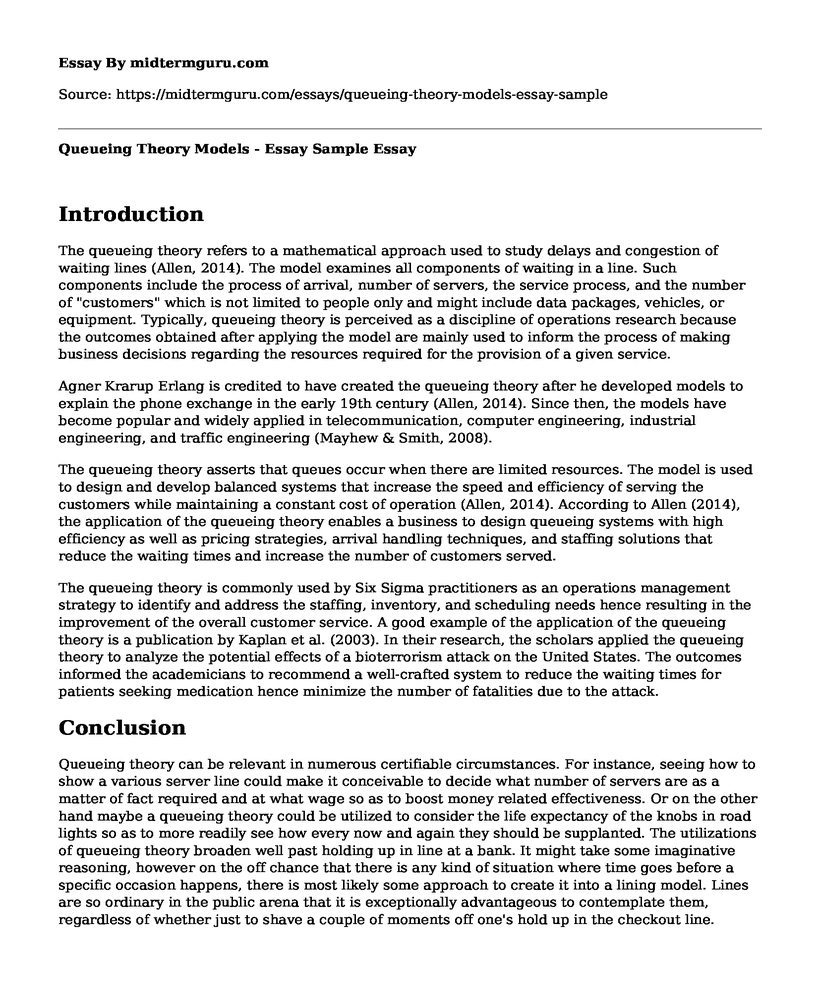Introduction
The queueing theory refers to a mathematical approach used to study delays and congestion of waiting lines (Allen, 2014). The model examines all components of waiting in a line. Such components include the process of arrival, number of servers, the service process, and the number of "customers" which is not limited to people only and might include data packages, vehicles, or equipment. Typically, queueing theory is perceived as a discipline of operations research because the outcomes obtained after applying the model are mainly used to inform the process of making business decisions regarding the resources required for the provision of a given service.
Agner Krarup Erlang is credited to have created the queueing theory after he developed models to explain the phone exchange in the early 19th century (Allen, 2014). Since then, the models have become popular and widely applied in telecommunication, computer engineering, industrial engineering, and traffic engineering (Mayhew & Smith, 2008).
The queueing theory asserts that queues occur when there are limited resources. The model is used to design and develop balanced systems that increase the speed and efficiency of serving the customers while maintaining a constant cost of operation (Allen, 2014). According to Allen (2014), the application of the queueing theory enables a business to design queueing systems with high efficiency as well as pricing strategies, arrival handling techniques, and staffing solutions that reduce the waiting times and increase the number of customers served.
The queueing theory is commonly used by Six Sigma practitioners as an operations management strategy to identify and address the staffing, inventory, and scheduling needs hence resulting in the improvement of the overall customer service. A good example of the application of the queueing theory is a publication by Kaplan et al. (2003). In their research, the scholars applied the queueing theory to analyze the potential effects of a bioterrorism attack on the United States. The outcomes informed the academicians to recommend a well-crafted system to reduce the waiting times for patients seeking medication hence minimize the number of fatalities due to the attack.
Conclusion
Queueing theory can be relevant in numerous certifiable circumstances. For instance, seeing how to show a various server line could make it conceivable to decide what number of servers are as a matter of fact required and at what wage so as to boost money related effectiveness. Or on the other hand maybe a queueing theory could be utilized to consider the life expectancy of the knobs in road lights so as to more readily see how every now and again they should be supplanted. The utilizations of queueing theory broaden well past holding up in line at a bank. It might take some imaginative reasoning, however on the off chance that there is any kind of situation where time goes before a specific occasion happens, there is most likely some approach to create it into a lining model. Lines are so ordinary in the public arena that it is exceptionally advantageous to contemplate them, regardless of whether just to shave a couple of moments off one's hold up in the checkout line.
References
Allen, A. O. (2014). Probability, statistics, and queueing theory. Academic Press.
Kaplan, E. H., Craft, D. L., & Wein, L. M. (2003). Analyzing bioterror response logistics: the case of smallpox. Mathematical Biosciences, 185(1), 33-72.
Mayhew, L., & Smith, D. (2008). Using queuing theory to analyze the government's 4-h completion time target in accident and emergency departments. Health care management science, 11(1), 11-21.
Cite this page
Queueing Theory Models - Essay Sample. (2022, Oct 31). Retrieved from https://midtermguru.com/essays/queueing-theory-models-essay-sample
If you are the original author of this essay and no longer wish to have it published on the midtermguru.com website, please click below to request its removal:
- Paper Sample: Intuition in Maths and the Role That It Plays in This Field
- Politics Essay Sample: Political Geography and Theoretical Models
- How Diversity Affects Local Feed Yard
- Euler's Contributions to the Modern Day Mathematics Essay
- Paper Example on Primate Intelligence Evolution
- Essay Sample on Chemistry of Sediment and Water of Des Plains
- The Homo Sapiens and Neanderthals - Essay Sample







